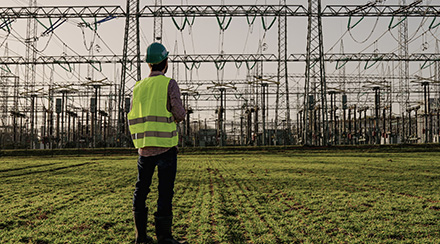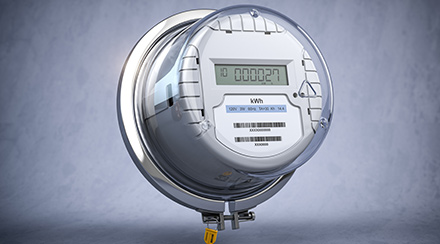What Are the Benefits of a Retail Energy Supplier?

Depending on where you live, there may only be one place to buy electricity or gas: directly from your utility, the company that generates energy and delivers it to you. But if you live in a state with a competitive energy market, you probably have your choice of several suppliers that are competing to win your business. Residents of these states can use this to their advantage to find plans and benefits that utilities often can’t match.
What Is a Retail Energy Supplier?
In states with competitive markets, retail energy suppliers, like NRG, are companies that buy electricity and/or gas from the wholesale market in bulk and resell it to residential and business customers. Instead of acting merely as middlemen, retail suppliers diversify their products and compete to provide customers with choices they wouldn’t otherwise have.
Retail suppliers don’t exist in states that haven’t adopted a competitive market. Instead, residents and businesses in those states must buy electricity and gas from the utility that delivers it to them.
How Are Retail Electricity and Gas Suppliers Different from Utilities?
There are several differences between retail energy/gas suppliers and utilities. Both work together to bring energy to customers in competitive energy states, but they’re responsible for different parts of the process.
Utilities are responsible for delivering electricity and gas to customers through their network of power and gas lines. They own the lines, transformers, substations, utility poles and other parts of the energy infrastructure. Utilities are in charge of keeping this equipment in good working order, as well as restoring power after an outage and fixing gas leaks.
Retail energy suppliers are responsible for signing customers up for electricity and/or gas service. They handle billing, payment processing and other account services. They also help facilitate account transfers whenever customers choose to switch suppliers.
So if you’re experiencing a power outage or issues with your gas lines, or notice downed power lines, you’ll want to contact your utility to report the problem. And if you have an issue with billing or payments, those requests should go to your retail supplier.
What Can Retail Energy Suppliers Do Better Than Utilities?

Utilities in states without energy competition function a lot like monopolies – since customers can’t take their business elsewhere, the utilities face very little pressure to offer more choices or better services to their customers.
The opposite is true in states with competitive energy markets; retail energy suppliers compete with each other by maximizing customer choice and offering benefits that may set them apart from the competition. Here are a few of the ways in which retail suppliers do more for their customers:
- Pricing options. Many suppliers give customers the choice between fixed-rate plans and variable-rate plans. Customers with a fixed-rate plan lock in a rate for a period of time, which protects them if energy costs rise during their plan term. Those with variable-rate plans may see pricing fluctuate month-to-month. With utilities, customers often have only one option.
- Special pricing. Some suppliers have special pricing features. Time-of-use pricing, for example, allows customers to pay a lower rate at night. Suppliers may also offer free weekend pricing, in which there are no electricity charges on Saturday and Sunday.
- Superior customer service. Because it’s so easy for customers to take their business elsewhere, suppliers are especially motivated to provide excellent customer service at all times.
- Perks and incentives. Some suppliers compete by offering special perks to customers who switch to them or renew their contracts, like deals on smart home products, electronics and event tickets, or incentives like travel miles, gift cards and other rewards.
- Green electricity. Customers who want to promote a cleaner environment can often find retail suppliers who feel the same way. Certain plans and suppliers can do this by investing in renewable energy, buying clean energy credits or planting trees as they sign up new customers.
Advocates of energy competition believe that all customers deserve access to these choices and benefits. The states that do not currently have competitive energy markets may still make the decision to switch. Check this map to see which states currently have competitive energy markets.
Looking for Something Specific?
Select a category to find resources for topics that interest you.
Select Category

Related Articles:

How to Read Your Energy Bill
When’s the last time you really looked at your energy bill? If you ever want to know exactly where your money is going – or if you might be able to save on energy costs – you should spend a few minutes taking a deep dive into your latest energy bills.
Read Article
What’s the Difference Between Utilities and Suppliers?
In a competitive energy market, suppliers can compete with each other and often the utility for customers. Learn the differences between utilities and suppliers and the parts that both play in getting energy to your home.
Read Article
What Is a Smart Meter?
Did you know energy utilities have been installing “smart meters” on homes for years, replacing old-fashioned electricity meters with the latest technology? Learn all about smart meters, its benefits, and how they can make a difference for you.
Read ArticleMost Popular Articles

Energy Plans to Fit Your Lifestyle
NRG offers electricity and natural gas plans with perks like cash back, travel rewards and more, so you can find a plan that fits your home and family.
What Are the Benefits of a Retail Energy Supplier?
Depending on where you live, there may only be one place to buy electricity or gas: directly from your utility, the company that generates energy and delivers it to you. But if you live in a state with a competitive energy market, you probably have your choice of several suppliers that are competing to win your business. Residents of these states can use this to their advantage to find plans and benefits that utilities often can’t match.
What Is a Retail Energy Supplier?
In states with competitive markets, retail energy suppliers, like NRG, are companies that buy electricity and/or gas from the wholesale market in bulk and resell it to residential and business customers. Instead of acting merely as middlemen, retail suppliers diversify their products and compete to provide customers with choices they wouldn’t otherwise have.
Retail suppliers don’t exist in states that haven’t adopted a competitive market. Instead, residents and businesses in those states must buy electricity and gas from the utility that delivers it to them.
How Are Retail Electricity and Gas Suppliers Different from Utilities?
There are several differences between retail energy/gas suppliers and utilities. Both work together to bring energy to customers in competitive energy states, but they’re responsible for different parts of the process.
Utilities are responsible for delivering electricity and gas to customers through their network of power and gas lines. They own the lines, transformers, substations, utility poles and other parts of the energy infrastructure. Utilities are in charge of keeping this equipment in good working order, as well as restoring power after an outage and fixing gas leaks.
Retail energy suppliers are responsible for signing customers up for electricity and/or gas service. They handle billing, payment processing and other account services. They also help facilitate account transfers whenever customers choose to switch suppliers.
So if you’re experiencing a power outage or issues with your gas lines, or notice downed power lines, you’ll want to contact your utility to report the problem. And if you have an issue with billing or payments, those requests should go to your retail supplier.
What Can Retail Energy Suppliers Do Better Than Utilities?
Utilities in states without energy competition function a lot like monopolies – since customers can’t take their business elsewhere, the utilities face very little pressure to offer more choices or better services to their customers.
The opposite is true in states with competitive energy markets; retail energy suppliers compete with each other by maximizing customer choice and offering benefits that may set them apart from the competition. Here are a few of the ways in which retail suppliers do more for their customers:
- Pricing options. Many suppliers give customers the choice between fixed-rate plans and variable-rate plans. Customers with a fixed-rate plan lock in a rate for a period of time, which protects them if energy costs rise during their plan term. Those with variable-rate plans may see pricing fluctuate month-to-month. With utilities, customers often have only one option.
- Special pricing. Some suppliers have special pricing features. Time-of-use pricing, for example, allows customers to pay a lower rate at night. Suppliers may also offer free weekend pricing, in which there are no electricity charges on Saturday and Sunday.
- Superior customer service. Because it’s so easy for customers to take their business elsewhere, suppliers are especially motivated to provide excellent customer service at all times.
- Perks and incentives. Some suppliers compete by offering special perks to customers who switch to them or renew their contracts, like deals on smart home products, electronics and event tickets, or incentives like travel miles, gift cards and other rewards.
- Green electricity. Customers who want to promote a cleaner environment can often find retail suppliers who feel the same way. Certain plans and suppliers can do this by investing in renewable energy, buying clean energy credits or planting trees as they sign up new customers.
Advocates of energy competition believe that all customers deserve access to these choices and benefits. The states that do not currently have competitive energy markets may still make the decision to switch. Check this map to see which states currently have competitive energy markets.
Looking for Something Specific?
Select a category to find resources for topics that interest you.
Select Category

Related Articles:

How to Read Your Energy Bill
When’s the last time you really looked at your energy bill? If you ever want to know exactly where your money is going – or if you might be able to save on energy costs – you should spend a few minutes taking a deep dive into your latest energy bills.
Read Article
What’s the Difference Between Utilities and Suppliers?
In a competitive energy market, suppliers can compete with each other and often the utility for customers. Learn the differences between utilities and suppliers and the parts that both play in getting energy to your home.
Read Article
What Is a Smart Meter?
Did you know energy utilities have been installing “smart meters” on homes for years, replacing old-fashioned electricity meters with the latest technology? Learn all about smart meters, its benefits, and how they can make a difference for you.
Read ArticleMost Popular Articles

Energy Plans to Fit Your Lifestyle
NRG offers electricity and natural gas plans with perks like cash back, travel rewards and more, so you can find a plan that fits your home and family.







